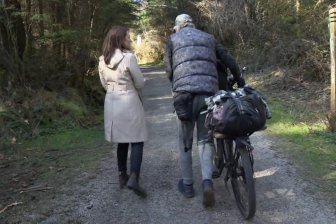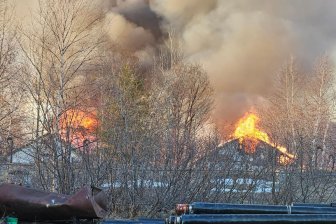Editor’s note: This article was updated with comments from the Ontario Ministry of Health and Health Canada.

A new program to train desperately needed medical lab workers amid a growing backlog of COVID-19 tests is being rolled out at The Michener Institute in downtown Toronto, Global News has learned.
The program will prepare up to 600 lab workers in a condensed, intensive two-day course online followed by two hours of in-person lab experience at the Michener Institute of Education at University Health Network starting Wednesday. The institute said the Ontario government was funding the training program.
The institute hopes that the new workers will reduce the workload for the certified technologists and assistants who face a backlog of more than 26,500 unprocessed tests as of Oct. 14. The newly-trained lab workers would be able to do some preliminary work in the lab to prepare test kits, but they wouldn’t be qualified to analyze results.

Medical laboratory technologists (MLT) would continue to analyze samples, Tassone said. It can take two to four years of study to become an MLT and up to a year to become a lab assistant.
“What we’re doing is really taking an educational strategy that extends the clinical team that supports the labs and the testing that’s needed for COVID-19,” she said. The new program started the same day the Ontario government announced close to a hundred new contact tracers would start work this week, with hundreds more expected over the next month.

Long-wait times for coronavirus test results, which plagued Ontario in the spring, have reemerged amid the second wave in the fall. As of Tuesday, there was a backlog of more than 24,000 incomplete tests down from a peak of almost 90,000 tests on Oct. 2.
Health experts and officials say the ongoing logjam of tests is created by a record demand for tests, a lack of lab technologists and a shortage of testing supplies.
Calls for more certified lab techs
Dr. Tony Mazzulli, microbiologist in chief at Mount Sinai Hospital in Toronto, said his lab has the capacity to complete in excess of 10,000 tests a day — among the largest in the province.
He said the staffing shortages at labs were “critical.”
“We need qualified, licensed medical lab technologists who actually perform the test and all the labs are vying for the same pool of individuals,” Mazzuli said.
READ MORE: Massive coronavirus test wait times not a sign of ‘good testing regime
He remembers when lab training programs were first cut by the province in the mid-1990s. And now with his labs running around the clock, Mazzuli said he is still evaluating whether he will hire from grads of the new Michener program.
“I would prefer certified, fully-licenced, qualified medical lab technologists,” he said. “But if push comes to shove and we have no alternative, we may have to.”
Dr. Kevin Katz who oversees the Shared Hospital Lab whose members include North York General and Michael Garron hospitals, Sunnybrook Health Sciences Centre and Scarborough Health Network said he has already started to “onboard” some students who he expects will complete the Michener course.
“We’re maximizing the use of lab assistants and these science grads for the non-interpretive components. And it is relieving pressure for us,” said Katz.

But with labs running 24/7 and being asked to ramp up testing capacity, Katz said this new program won’t resolve one of the main challenges faced by his lab and others in the province: a severe shortage of certified lab technologists.
“We would easily hire another 15 or 20 lab technologists if we could,” he said.
“Two weeks ago, I would have said the instruments were the problem. Right now, it’s human resources.”
Katz said in some cases the machines used to analyze COVID-19 tests aren’t at maximum output because there just aren’t enough technologists.
“I think there’s just a shortage across the entire system.”
READ MORE: Woman waits 7 hours for COVID-19 test, calls it ‘unacceptable in a modern city like Toronto’
It’s something Christine Nielsen, CEO of the Canadian Society for Medical Laboratory Science (CSMLS), has repeatedly asked the provinces and the federal government to fix for more than a decade.
Documents obtained by Global News show that CSMLS has been sounding the alarm about the dwindling workforce in labs since 2007.
“It was already a stressful work environment, but the pandemic and the impact this is having on every single person in Canada, it is pretty profound,” Nielsen said.
She estimated Ontario labs are short 200-300 medical lab professionals and 50 per cent of the current workforce is eligible for retirement in the next five years.
In pre-budget submissions to both the Ford and Trudeau governments this year, the organization recommended that funding to increase enrollment of medical lab techs be increased by 10 per cent, while another $20 million be set aside to onboard lab techs trained in other countries who now reside in Canada.
The calls have largely fallen on deaf ears and are only starting to be acknowledged now by officials.
“The problem is as we get older, as Canadians, we consume more health-care services and in particular, lab results,” Nielsen said adding that Ontario labs were already producing 500,000 medical tests even before COVID-19. “The amount of testing is going up as well. At the same time that we have a decline in the workforce.
“There is actually a global shortage of medical lab professionals, with few exceptions.”
Labs across the country experiencing shortages
Shorthanded labs are not isolated to Ontario. According to the latest Statistics Canada’s Job Vacancy and Wage Survey, there 845 vacancies among laboratory technologists, technicians and pathologist assistants in the third quarter of 2019.
The union representing Saskatchewan front-line health-care workers also sent a recent letter to Premier Scott Moe calling on him to address the “decade of government neglect” in the province’s lab sector.
And in Quebec, there was a backlog of about 12,300 unprocessed COVID-19 tests on Oct. 3, according to the most recent provincial statistics.
Jerry Zaharatos, chief of medical microbiology at the Jewish General Hospital and the McGill University Health Centre, said labs across the province have been under tremendous pressure to produce more and more results.
“They don’t want to let the population down. They don’t want to let each other down because if one of them gets sick or if one of them has repetitive motion injury, the whole lab is at risk,” Zaharatos said.
His plea to public health officials: don’t forget about the lab techs.
“If nurses and doctors are sort of considered the heart of of the hospital, the medical laboratory technologists are are really the lungs of the institution”
Part of the dearth of lab techs, according to experts, is that training in the field is expensive, costing up to $100,000 to open up a new spot. And with an aging workforce looking to retire, there aren’t enough people taking their place, leaving labs short-staffed amidst a global crisis.
READ MORE: Why contact tracing becomes ‘impossible’ as coronavirus cases surge
Michelle Hoad, CEO of the Medical Laboratory Professionals Association of Ontario, said that of the five medical lab programs in Ontario, all are at full capacity with many facing long waitlists.
“It’s really, really frustrating and exhausting,” said Hoad. “Seventy per cent of labs in Ontario were understaffed prior to the pandemic,” she said.
“We’ve been lobbying for this for now almost 24 months. You need to open up more seats because there’s going to be a shortage. And guess what? We’ve got a pandemic and now you can actually start to see the shortage.”
“That workforce right now is understaffed and overworked, and it is truly commendable that they are coming in every day and doing the best they can,” she said.
The Ontario Ministry of Health confirmed in an email that it provides funding to the Michener Institute for about 800 students per year.
The ministry didn’t immediately respond to questions about whether it has increased funding as a result of the labour shortages. But it explained that it had collaborated with core laboratories in Ontario to address the needs.
It added that the training would leverage the expertise of science graduates transitioning from research to medical laboratory settings in Ontario and alleviate the human resources pressures on labs and increase their capacity for COVID-19 testing.
In terms of credentials, the ministry said that the program would be focused on students with master’s or PhD degrees. It would also consider accepting people with BSc degrees and appropriate lab experience, the ministry explained.
Last week, Premier Doug Ford Ontario acknowledged the shortage was contributing to medical laboratories being overwhelmed.
“We have an issue with getting enough diagnostic lab technicians, we’re reaching out right across the province,” he said.
Ontario has said it is sending COVID-19 tests to labs in other provinces including Nova Scotia and New Brunswick, and even California to get tests processed faster.
Prime Minister Trudeau also announced last week the National Microbiology Laboratory will help Ontario process an additional 1,000 tests daily.
But for Dr. Katz and others in the field, they are concerned that governments at all levels need to be doing more to support Canada’s vital labs.
“Lab technologists and lab assistants are the unsung heroes of this pandemic,” he said. “But a lot of us are concerned that this can’t be sustained forever.”















Comments